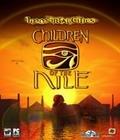
Genre: Strategy
Publisher: Myelin Media
Developer: Tilted Mill
Release Date: November 8, 2004
Buy 'IMMORTAL CITIES: Children of the Nile': PC
More articles about Immortal Cities: Children of the Nile

As an Amazon Associate, we earn commission from qualifying purchases.
 Children of the Nile is a strategy game where citizens who behave like real people are your primary resource. As their leader, you must build a place in which they can live and work, establishing a relationship of trust and cooperation which you then leverage to build a lasting civilization, and bring it to its cultural peak.
Children of the Nile is a strategy game where citizens who behave like real people are your primary resource. As their leader, you must build a place in which they can live and work, establishing a relationship of trust and cooperation which you then leverage to build a lasting civilization, and bring it to its cultural peak.
Genre: Strategy
Publisher: Myelin Media
Developer: Tilted Mill
Release Date: November 8, 2004
Buy 'IMMORTAL CITIES: Children of the Nile': PC